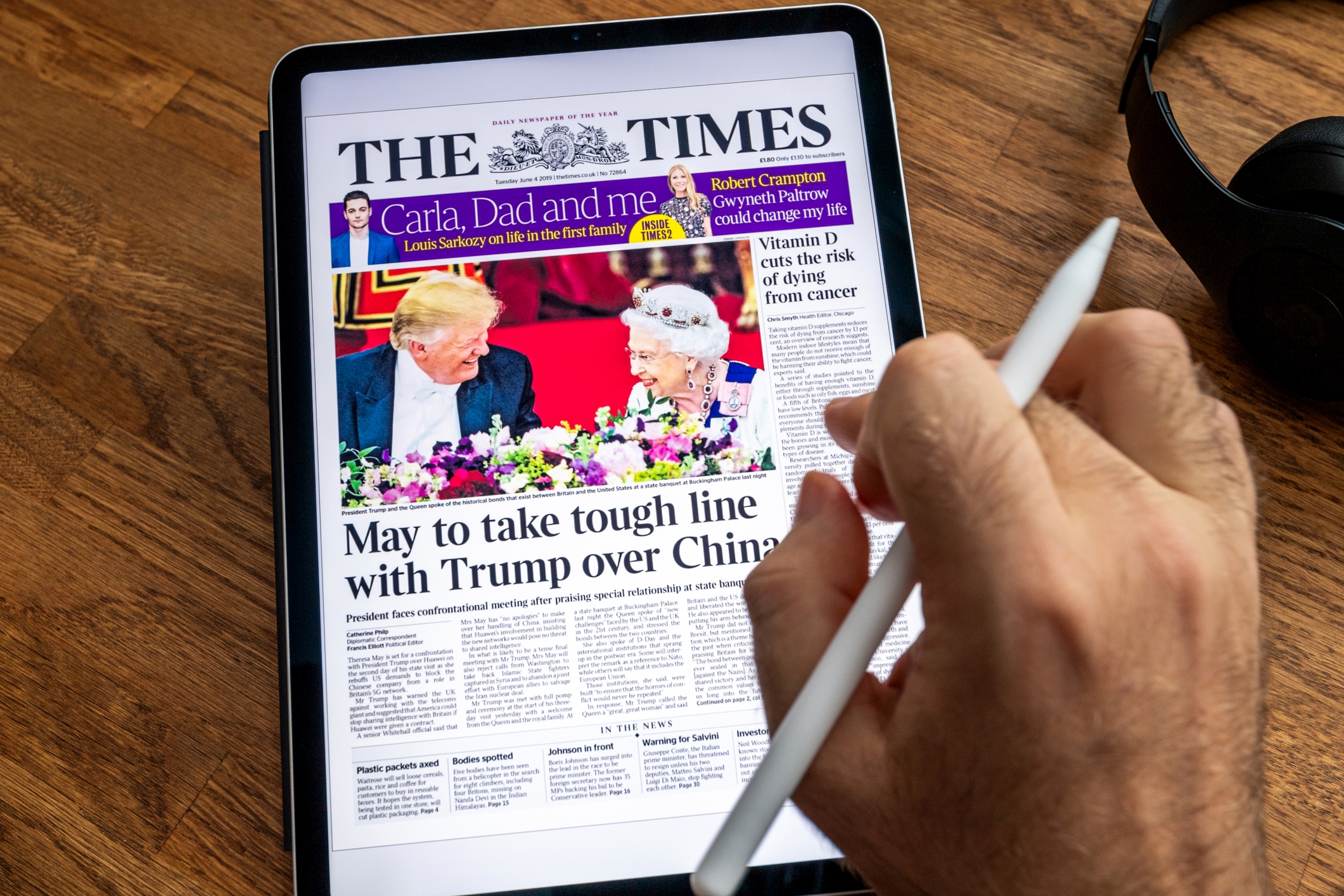Which services are we really willing to pay for? Ever since the internet found its way into our homes, there have been debates about free and paid content. The problem: Unlike physical products we can touch and use, online services feel quite intangible. And while most of us have free or cheap access to music, thanks to YouTube and streaming services, publishing companies are unwilling to give up the fight just yet. Currently, subscription-based paywalls are their weapon of choice, but the majority of users are not amused! So what should successful online journalism look like?

When I was young, everything was much simpler. My parents had subscribed to the local newspaper and a weekly magazine that covered more important issues with deeper analyses. This setup pretty much covered everything from the local dog breeders' club to global politics. The weekend edition frequently weighed up to a pound so subscribers could actually feel what they spent their money on. Subscriptions had been the way to go for over 20 years and nobody ever thought about alternatives because there was no competition. That articles were always one day old barely mattered. This went on for many years until the world got smaller and more information-dense!
Nowadays, yesterday's news are old hat and hyperlinks or Google Search help quickly expand on a topic. Publishing companies took notice and felt the consequences: Sales are down by up to 80% and smaller publishers either went out of business, merged with rivals or significantly cut down their staff. The initial strategy of offering a handful of online articles for free to foster print sales has failed. The internet took on a life of its own and, while full-fledged lead articles still remain mostly absent, there are now a myriad of free news outlets available. Naturally, readers quickly warmed up and kicking back in your favorite chair while swiping through today's multimedia-enriched news on your tablet has become part of the morning routine for many – newspapers are a nice to but not a must have!
What has been giving publishers worry crinkles lately is their customers' payment morale. A recent poll shows only 60 percent would consider paying for journalistic content online. 30 percent believe digital content should be free. Publishers also tend to overestimate the potential revenue generated by ads. When taking into account that 50% of users are already paying for streaming services like Netflix or Amazon Prime, the picture becomes even more complex. Apparently, users are making a strong distinction between entertainment (worth paying for) and news, considered by many hardly subscription-worthy. As an educated citizen, I find this shocking! Still, it's too early to pass the buck to the readers.

In many cases, the transition into the digital age didn't go smoothly for publishers. Readers are frequently exposed to confusing payment models, technical issues and uninspired designs. Some publishers are resorting to loud and flashy headlines or bizarre exaggerations to woo customers. On top, prices are simply thought as too high by many readers. Why would you pay almost the same amount for an online or PDF edition that you'd pay for the print version when publishers save big on print, distribution and logistics costs? Many publishers have significantly cut down their editorial staff and it shows! Sure, it is possible for a newspaper to exist solely on agency reports with as little self-contribution as possible, but that's certainly no recipe to wean readers into your brand. Sites that offer the bare informational minimum are a dime a dozen and so are entertainment portals. Readers long for personally relevant, curated information.
While some are predicting the end of traditional publishing houses altogether, others demand a profound change in thinking. There are ideas to bundle and offer several papers at a fixed price, a model that has had some success in the magazine market. A "Netflix" for news may win over skeptics and stimulate sales. But long-lasting disputes between the various publishers are a serious roadblock and there are fears that the perceived value of individual papers could suffer greatly if offered as part of a bundle. Doubters like to point out the underwhelming success of music portals and the meager royalty fees. Other magazines try to offer more current news or provide their readers with trenchant daily recaps and exclusive content, like videos or comprehensive in-depth articles. Still others abandoned print altogether and focus on their online presence – with yet uncertain results.
These surely are exciting times for journalism. My hope is that we'll still have access to a diverse and varied media landscape in the future. After all, no functioning democracy can exist on a mere handful of, sometimes government-controlled, news outlets alone. And what would cozy weekend mornings be without local news?
What I would like to know: Are you prepared to pay for online news? Do you already have a subscription?




I subscribe to the online edition of one newspaper; The Globe and Mail. It is more expensive than I like, but it would be hard to live without.
Other online newspapers often allow anyone to read a few of their articles every month. I find that handy.
I pay for a subscription service for my daily paper. My feeling is a fair price should be set and I think the paper keeps getting more expensive for a online service. Personally I'm about to drop their service.
Good article. We need a vigorous and robust press. I support the Netflix model provided it has limited editorialising. The distortions of news by the Murdoch model is hugely a put off here in Australia.
Of course I pay for on line journalism. Why on earth should reporters, who risk their lives more and more often to get real news, be expected to work for free?
News, done right is a hard, dangerous, costly job. Too many of the "free" news sites online have simply stolen material and put it up without attribution or payment.
This is totally offensive to me, but I'm a retired reporter and am sick to death of the idea that everything should be free solely because people WANT it to be. I suppose all those people don't expect a paycheck for their jobs? Yeah, that's what I thought.
When you paid for a newspaper or magazine you understood exactly what you were obliged to pay for. When you pay on line you dam well better have a very secure device because it's tracking you, selling your contact info to an infinite number of marketing people without permission. You will not be subject to hacking from buying a newspaper, but your on line news retailer is highly likely to be hacked and your purchasing info is highly vulnerable at any moment. There is no security on line, absolutely none, to your wallet. DO NOT believe them when they tell you there is. Buy a newspaper and enjoy it risk free.
Thank you Sven for an interesting piece. Yes, I do subscribe to a daily newspaper - the Guardian - but only to their digital edition. I read the digital edition for around a year before subscribing.
As with all news media, UK news is biased. The Guardian's bias is closest to my own. As for local news one has to wonder if The Coventry Telegraph is written on a different planet.
Yes, I have a number of online subscriptions, both of daily newspapers (most from Catalonia) and a number of weekly magazines, national as well as from abroad.
I feel this is right: it is true that the publishers save on paper, transport, etc. but the articles still have to be written and investigated and those who write and investigate deserve decent wages, and their expenses have to be paid as well!
I was once a Newspaper Production manager, until it merged with the competitor.
Physical print is disappearing. The cost to print is astronomical when compared with Internet.
It is inevitable that a very high percentage of print will be gone.
Mad magazine has recently announced it is ending most of it's printed magazine.
As far as paying for a subscription? It would depend on content. Magazines and newspapers had a myriad of content from pictures of events to note worthy news.
It was so amazing to see the world that way.
You also had the ability to cut out the article that pleased, or displeased you the most. Some would frame it and hang it somewhere for conversation.
Cost is the motivator though. Without the cost of printing then the rates should be low. I have noticed a local paper that has become very small and yet the price has gone way up. To much to justify a subscription.
At this point I will not pay for newspaper online content. Too much of the news we are getting today is biased. By that I mean it is not reflecting debate but presents a strongly biased viewpoint in favour of certain political persuasians. This is reflected strongly in the debate over Israel Folau and his sacking by the Australian Rugby Union. Things Folau has written are taken out of context and misquoted by the news media and a slur campaign has taken place. The difference between Fox news and CNN over the Trump /Clinton saga is another case of strongly biased media.
When the news media begin to use good grammar again and present a fairer argument on disputes I will reconsider but at present there is too much biased and fake news and I will not pay for that.
Hard Print still prime as witnessed by the number of people who purchase a daily newspaper.
Whilst with a Library Membership (in the U.K.) free access is upon signing on given to the reader to daily newspapers (one does still pay for one's own Broadband Provider to sign on, then gain access to the internet and the free news on the various websites).
Thus, other than to the Broadband Provider one does not need to pay!!!
i have sympathy for the print media, however it is similar to the sympathy I feel for farm labourers, miners, steel workers, and countless other industries which are or have reached the end of useful life.
It is inevitable that old technology and working practices will become irrelevant with new methods and technology. If we tried to return to farming using horses it would be stupid despite the Greens aiming for this archaic idyll .
Local papers have struggled for years and I can fully understand that. However now we are seeing the beginning of the end for National papers too. I am only surprised they have survived this long, with TV and radio offering news throughout the day. Young adults today rarely use print, the view everything via the screen and many are frankly not even interested in what us older generations would call news .
I am not very hopeful for traditional journalism for all the above reasons and suspect it will get progressively worse with the passage of time.